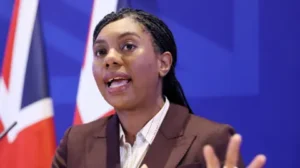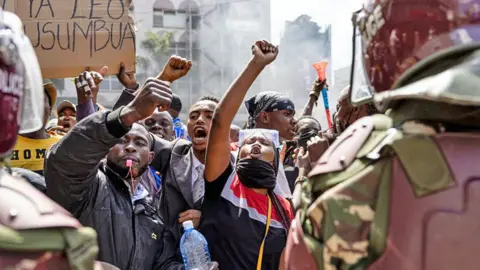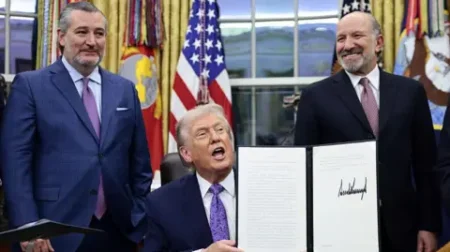In a recent BBC investigative report, pressure is increasing for a thorough inquiry into the conduct of Kenya’s police and military forces following allegations of excessive force and the killing of protesters during demonstrations against a controversial finance bill. The exposé, produced by BBC Africa Eye, reveals disturbing evidence involving the security forces, specifically pointing to the unfortunate incident where three protesters lost their lives during a chaotic event outside Kenya’s parliament in June 2024.
Leading human rights organizations such as Amnesty International and the Kenya Human Rights Commission (KHRC) are now vocally demanding accountability. They insist that the officers named in the documentary be held fully responsible for their actions. The public outcry rooted from these findings has reignited calls for justice among advocates, citizens, and stakeholders deeply concerned with human rights in Kenya.
In response to the exposé, the Kenyan government has voiced its opinion through a spokesman suggesting that every life holds equal value, while claiming that the investigations into these grave accusations are being pursued by the police watchdog. However, they have also criticized the BBC for what they deem a “one-sided” portrayal of events. Isaac Mwaura, a government official, expressed that the documentary failed to present a balanced view, specifically noting the omission of footage that might illustrate the broader chaos surrounding the protests.
The tragic events began to unfold on June 25, 2024, when over 100,000 people rallied in Nairobi to contest the government’s proposed tax hikes, collectively deemed unjust. The BBC’s investigation details a ferocious response from security personnel, including live ammunition fire directed towards unarmed protesters, thus drawing a line under the controversial finance bill designed to generate $2.7 billion aimed at reducing reliance on external borrowing.
The investigation meticulously gathered and analyzed over 5,000 images and videos, exposing the identities of both police and military personnel who allegedly opened fire during the protests. Human rights groups have reported that this violent crackdown led to at least 65 fatalities, a number that starkly contrasts with the government’s official count of 42 deaths. Moreover, the report brought attention to numerous cases of enforced disappearances and mass arrests amid escalated tension following the protests.
Despite the mounting evidence, government spokesman Isaac Mwaura suggested that the work of the documentary team could have benefited from the government’s input for a more rounded narrative. The confrontation between protesters and law enforcement is further exacerbated by varying opinions within the Kenyan parliament, with contrasting views on addressing these matters. While some members echoed the sentiments of the government, indicating a desire to silence critical media outlets, others like Millie Odhiambo defended the need for transparent dialogue without suppression.
Following the controversial documentary’s release, the Independent Policing Oversight Authority (IPOA) updated the public regarding their ongoing investigations, admitting to examining numerous cases that revolve around police involvement in the unrest. However, questions linger about the effectiveness and independence of the investigations as the trust in law enforcement continues to wane.
The ramifications of the BBC’s exposé and the tragic events of June 2024 have stirred a volatile atmosphere among Kenyans. Amid the power struggle and political unrest, President William Ruto has faced fierce criticism, particularly concerning his administration’s approach to addressing the allegations of police brutality and accountability of actions taken by security personnel. Advocates for justice remain hopeful that these calls for accountability will lead to meaningful change, reflecting a widespread desire for a more humane and just response to civil unrest in Kenya.
As public sentiments continue to rise against police impunity, citizens are encouraged to advocate for a thorough investigation that seeks to uncover the truth behind the loss of innocent lives during the protests. The spotlight remains on the government and its security forces to act decisively and transparently, not only to restore trust within communities but also to uphold Kenya’s commitment to respecting human rights for all its citizens.











